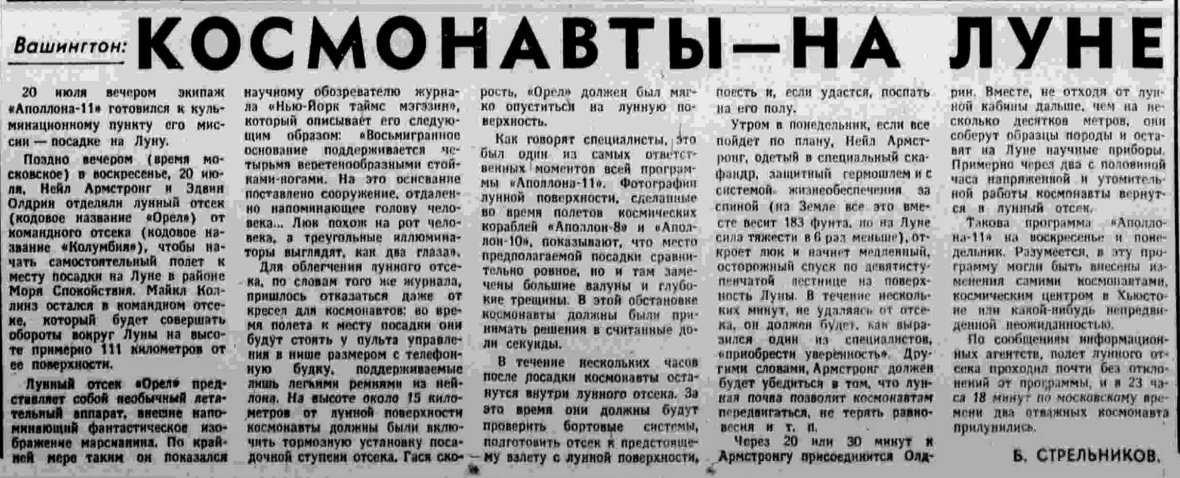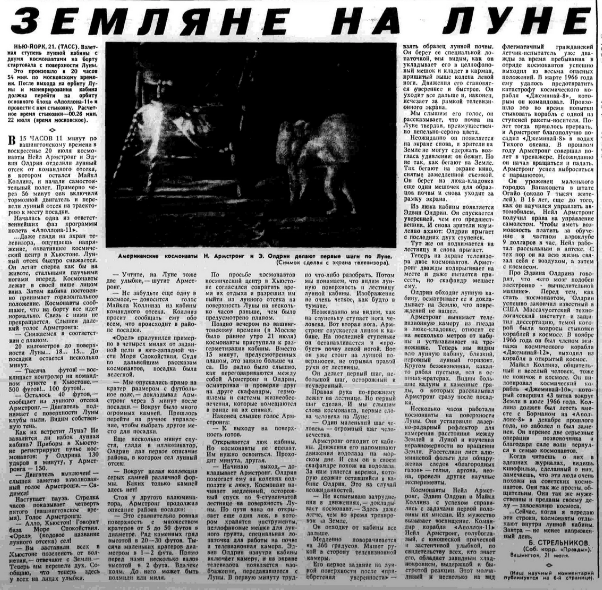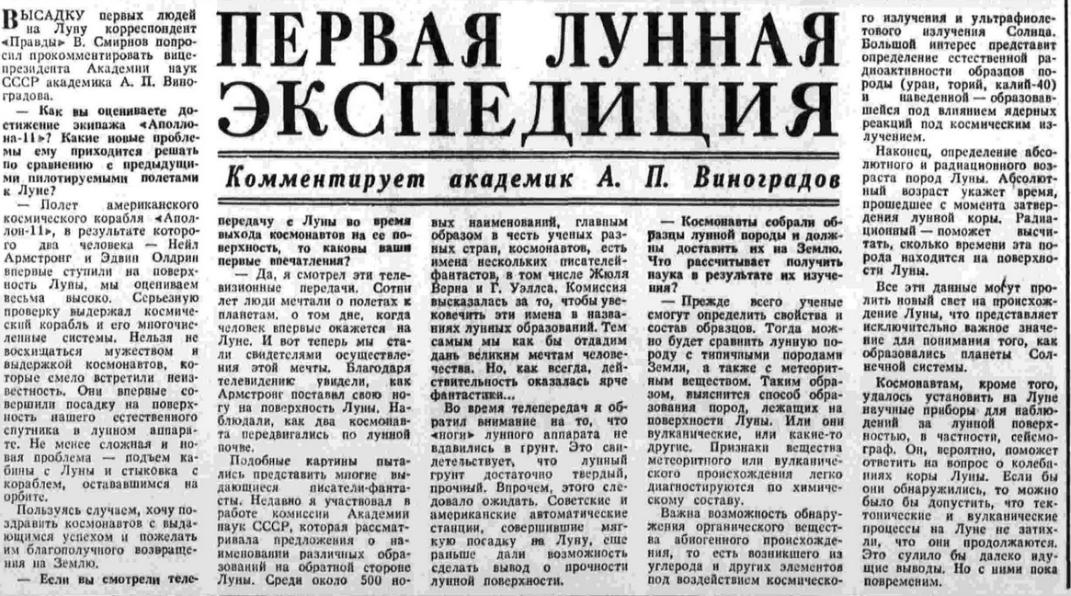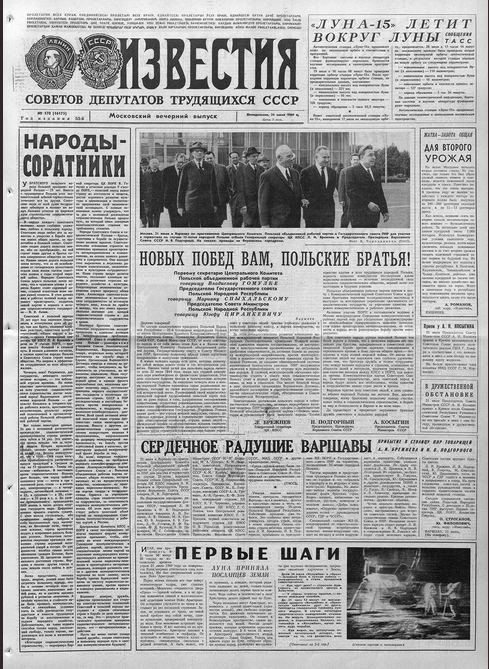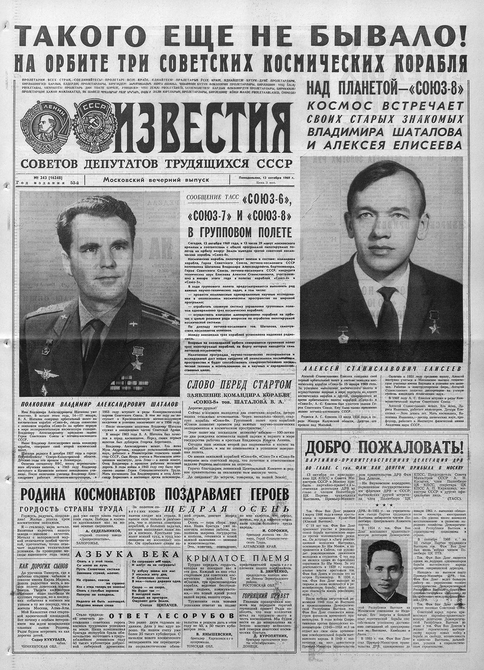TL; DR: Landing on the moon was covered in the Soviet press, and was well known in the Soviet Union. It received much less attention than Soviet space missions, though.
Just to add something factual to previous answers.
NASA on U.S.S.R. reaction
NASA's Astronautics and Aeronautics, 1969 (15 MB PDF file) contains some useful information on press coverage of moon landing in USSR:
July 16 (p. 225) Worldwide audience focused on Apollo 11 launch:
U.S.S.R. radio and TV gave factual accounts on Apollo 11 launch but maintained third day of silence on Luna XV. Major Soviet news program at 8:30 pm Moscow time showed tape of Apollo 11 liftoff taken from live comsat coverage.
July 17 (p. 230): Izvestia gave the first U.S.S.R. report of President Nixon's July 17 announcement that medals of two dead Soviet cosmonauts would be placed on moon by Apollo 11 astronauts. Factual account of mission carried no comment (W Post, 7/19/69, A10)
July 20-21 (p. 233): Soviet Premier Alexsey Kosygin complimented U.S. on lunar landing and expressed interest in widening U.S.-U.S.S.R. space cooperation during July 21 Moscow discussion with former Vice President Hubert H. Humphrey, who was ending Soviet visit. Soviet TV did not carry live coverage of Apollo 11 lunar landing July 20; Tass announcement was read by newscaster and carried in two-paragraph item on Pravda's front page. Evening paper, Izvestiya, accorded story more space and featured photo of astronauts on the moon. On TV, Cosmonaut Konstantin P. Feoktistov described landing as "major landmark" and said crew has coped "brilliantly" with mission. Georgy Petrov, Director of Soviet Institute for Cosmis Research, called Apollo 11 "outstanding achievement" but said more data per ruble could have been gathered by unmanned probes.
July 24 (p. 244): ... In U.S.S.R. TV viewers had live coverage for first time during mission at Moscow TV station hooked into Eastern Europe's Intervision network for live transmission of astronauts being deposited on carrier Hornet. Later, station devoted first two-thirds of final newscast to Apollo 11 and announced that Soviet President Nikolay V. Podgorny had sent telegram to President Nixon offering "our congratulations and best wishes to the space pilots."
Soviet Academy of Sciences president Mstislav V. Keldysh called voyage "a big contribution to space exploration and further progress of world science." Cosmonauts send message to Apollo 11 crew: "We... closely followed your flight. We wholeheartedly congratulate you on the completion of your wonderful journey to the moon and safe return to earth."
Soviet newspapers
Scanned imaged from Soviet newspaper available on this page from arhivtime.ru. It is claimed to be from "Pravda" issue of 22 July 1969.
Excerpts from an article:
Первая лунная экспедиция
комментирует академик А.П. Виноградов
- Как вы оцениваете достижение экипажа "Аполлона-11"? Какие новые проблемы ему приходится решать по сравнению с предыдущими пилотируемыми полетами к Луне?
Полет американского космического корабля "Аполлон-11", в результате которого два человека - Нейл Армстронг и Эдвин Олдрин впервые ступили на поверхность Луны, мы оцениваем высоко. Серьезную проверку выдержал космический корабль и его многочисленные системы. Нельзя не восхищаться мужеством и выдержкой космонавтов, которые смело встретили неизвестность. Они впервые совершили посадку на поверхность нашего естественного спутника в лунном аппарате. Не менее сложная и новая проблема - подъем кабины с Луны и стыковка с кораблем, остававшимся на орбите.
Пользуясь случаем, хочу поздравить космонавтов с выдающимся успехом и пожелать им благополучного возвращения на Землю.
Rough translation:
The first lunar expedition
interview with academician A.P. Vinogradov
- How do you rate the achievement of "Apollo 11" crew? What are the new problems they had to solve compared to previous manned flights to the Moon?
We highly appreciate the flight of the American spaceship "Apollo-11", in which two people - Neil Armstrong and Edwin Aldrin first set foot on the lunar surface. Spaceship and its many systems withstood a serious challenge. One can do nothing but admire the courage and self-possession of cosmonauts, who bravely met the unknown. They first landed on the surface of our natural satellite in the moon unit. New challenges are no less complex - ascent from Moon surface and rendezvous with orbiting spaceship
I take this opportunity to congratulate the cosmonauts with outstanding success and wish them a safe return to Earth.
Neil Armstrong's visit to USSR in 1970
In May 1970, Armstrong traveled to the Soviet Union. He presented a talk at the 13th annual conference of the International Committee on Space Research. He met Premier Alexei Kosygin and was given a tour of the Yuri Gagarin Cosmonaut Training Center.
Excerpt from Astronautics and Aeronautics, 1970:
June 2 (p. 190): Apollo 11 Astrounaut Neil A. Armstrong, on goodwill trip to U.S.S.R., watched TV broadcast of Soyuz IX launch during party in his honor in Moscow and was told by
Cosmonaut Georgy Beregovoy that mission was "especially in honor of your trip here."
Armstrong later presented moon fragment and small Soviet flag carried on Apollo 11 mission to Soviet Premier Aleksey N. Kosygin. Kosygin said he would "always cherish this gift as a symbol of a great achievement." He told Armstrong, "The Soviet peoples are second to none in admiring your courage and knowledge."
Q&A
DISCLAIMER: The rest of this answer contains personal opinion and partly based on the experience of communication with the people, who lived in the Soviet Union in the 1960s.
What was the internal Soviet response to the news?
Soviet officials and media praised astronauts and first moon landing was recognized as an exceptional achievement.
At the same time, Moon landing received significantly less attention than Soviet space program achievements (sputnik, first human into space, lunokhod). There was much more information published on Soviet missions, like Luna 15.
Did the Soviet citizens know it was happening at the time?
Soviet people were surely informed about it. Newspapers published articles on Moon landing, reports were broadcasted on TV and radio. Neil Armstrong, and Buzz Aldrin were widely known in Soviet Union.
Was it spun as a victory for humanity, or a victory for the United States, or a loss for the Soviet Union, or what?
As an achievement of the US space program and a victory for humanity. Certainly, it wasn't described as a victory for the United States/loss for the Soviet Union.
Soviet publications on space were largely centered around Soviet space program and its achievements. Sputnik, Gagarin's flight, first walk in space, various unmanned probes were largely praised as landmark achievements. In comparison, Moon landing was rarely mentioned and was never presented as a political victory for US.
Was the story reported accurately, or were details changed in the retelling?
The story was reported accurately. Soviet Union never tried to dispute the veracity of the moon landings. Again, highly-detailed reports on the event probably were never published in USSR.
